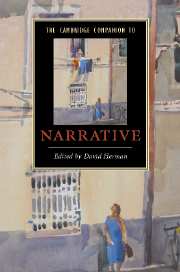8 - Genre
from Part II - Studying narrative fiction: a starter-kit
Published online by Cambridge University Press: 28 September 2007
Summary
In 1926 Agatha Christie published The Murder of Roger Ackroyd, dedicating it “to Punkie who likes an orthodox detective story, murder, inquest, and suspicion falling on everyone in turn!” The title signals to readers what kind of book Christie's narrative is, a classification that the dedication reinforces. The dedication specifies the basic components of an “orthodox” detective story: it begins with murder, which is followed by an investigation spotlighting each character in turn as a possible murderer, until the crime is solved and guilt is brought home to a specific character. As if these markers were not enough, the book abounds with references to detective stories: characters discuss their conventions and the book's first-person narrator, Dr. Sheppard, finds himself in the position of a “Watson,” the detective's friend and aid. These clues supply readers with a pragmatic user's guide to detective fiction.
This characterization of Christie's book is grounded in the notion of genre, grouping texts together on the basis of certain shared features. It suggests that relating a text to a genre may serve a number of different purposes. First, genre helps us to describe texts by singling out textual components worthy of attention such as plot structure; in turn, description helps us to classify a text by placing it among other similar texts. In this view, genres are principled groupings of texts. Second, genre directs the ways in which we write, read, and interpret texts. Without some shared conception of what, for example, a narrative is, writers would be unable to communicate with readers. A genre functions as a norm or an expectation guiding writers in their work and readers in their encounter with texts. Third, genre prescribes artistic practices. Generic conventions are normative, telling authors what they should and should not do. By claiming to have written an orthodox detective story, Christie shows her awareness of genre's prescriptive role. Fourth, genres help us to evaluate literary works.
- Type
- Chapter
- Information
- The Cambridge Companion to Narrative , pp. 109 - 124Publisher: Cambridge University PressPrint publication year: 2007
- 10
- Cited by

